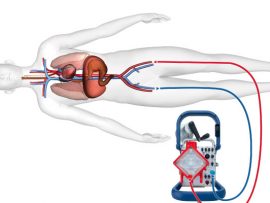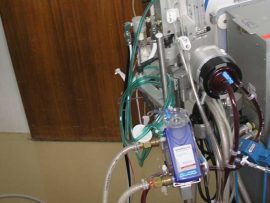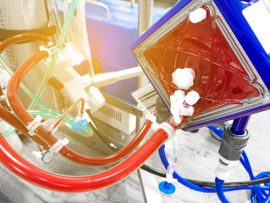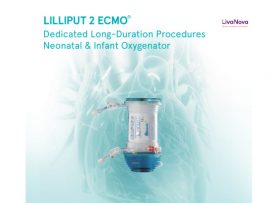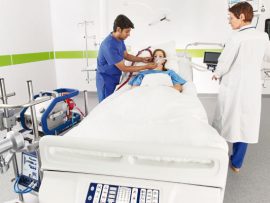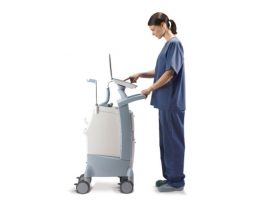Abstract Background and purpose Extracorporeal membrane oxygenation (ECMO) continues to play an essential role in organ support in cardiogenic shock or acute respiratory distress syndrome and bridging to transplantation. The..
Read MoreAbstract The recent widespread availability and use of mechanical circulatory support is transforming the management and outcomes of cardiogenic shock (CS). Clinical decision-making regarding the optimization of therapies for patients with..
Read MoreAbstract Over the last several years, the use of extracorporeal membrane oxygenation (ECMO) has exponentially increased. As the technology advanced, the rate of devastating complications has decreased somewhat, and the..
Read MoreAbstract Background Shock severity predicts mortality in patients with cardiogenic shock (CS). We evaluated the association between pre-cannulation Society for Cardiovascular Angiography and Interventions (SCAI) shock classification and mortality among..
Read MoreAbstract We describe three successful cases of HeartMate left ventricular assist device (LVAD; Thermo Cardiosystems, Woburn, MA, USA) implantation in patients with end-stage heart failure for long-term circulatory support. Patient..
Read MoreJörn Tongers, MD, discusses his recently published paper evaluating the efficacy and safety of early combined mechanical circulatory support (MCS) with an Impella® heart pump and venoarterial extracorporeal membrane..
Read MoreAbstract OBJECTIVES Our goal was to compare the haemodynamic effects of different mechanical left ventricular (LV) unloading strategies and clinical outcomes in patients with refractory cardiogenic shock supported with venoarterial..
Read MoreImpella 5.5 Support beyond 50 Days as Bridge to Heart Transplant in End-Stage Heart Failure Patients
Abstract Prolonged mechanical circulatory support (MCS) for severe left ventricular dysfunction in cardiogenic shock as a bridge to heart transplantation (HTx) generally requires a surgical procedure. Typically, a surgically implanted..
Read MoreAbstract Venoarterial extracorporeal membrane oxygenation (VA-ECMO) provides cardiovascular and respiratory support for patients in cardiogenic shock; yet, complications are a frequent source of morbidity and mortality. Limb ischemia can be..
Read MoreAbstract Background: The mortality rate for a patient with a refractory cardiogenic shock on venoarterial (VA) extracorporealmembrane oxygenation (ECMO) remains high, and hyperoxia might worsen this prognosis. The objective of..
Read MoreAbstract The use of veno-arterial extracorporeal membrane oxygenation (VA ECMO) for the treatment of refractory cardiogenic shock has increased signifcantly. Nevertheless, early weaning may be advisable to reduce the potential..
Read MoreAbstract Cardiogenic shock and cardiac arrest contribute pre-dominantly to mortality in acute cardiovascular care. Here, veno-arterial extracorporeal membrane oxygenation (VA-ECMO) has emerged as an established therapeutic option for patients suffering..
Read MoreAbstract Introduction It remains unclear whether patients who will not accept allogeneic blood transfusion can be managed successfully with veno-arterial (V-A) extracorporeal membrane oxygenation (ECMO). The objective of our study..
Read MoreAbstract Venoarterial extracorporeal membrane oxygenation (V-A ECMO) is increasingly used in cardiogenic shock for rapid stabilization and bridging towards recovery, long-term mechanical circulatory support or transplant. Although technological advances have..
Read MoreAbstract First described early in the pandemic, coronavirus disease 2019 (COVID-19)-associated fulminant myocarditis can present with arrhythmias and cardiogenic shock, but may be treatable with mechanical circulatory support, such as..
Read MoreAbstract Venoarterial extracorporeal membrane oxygenation (ECMO) is used in cardiogenic shock refractory to inotropic support and intra-aortic balloon pump (IABP) support. Peripheral ECMO can lead to ventricular distention, and IABP..
Read MoreAbstract During refractory cardiogenic shock and cardiac arrest, veno‑arterial extracorporeal membrane oxygenation (VA‑ECMO) is used to restore a circulatory output. However, it also impacts significantly arterial oxygenation. Recentguidelines of the..
Read MoreAbstract Venoarterial extracorporeal membrane oxygenation (VA ECMO) has been increasingly applied in patients with cardiogenic shock in recent years. Nevertheless, many patients cannot be successfully weaned from VA ECMO support..
Read MoreAbstract The use of temporary mechanical circulatory support in cardiogenic shock has increased dramatically despite a lack of randomized controlled trials or evidence guiding clinical decision-making. Recommendations from professional societies..
Read MoreAbstract Purpose of review Cardiogenic shock is a condition that is characterized by end-organ hypoperfusion secondary to reduced cardiac output, and is associated with substantial mortality. The mainstay of therapy..
Read MoreAbstract Purpose Venoarterial (VA ECMO) effectively supports refractory (rCS), and sustains macro- and . We investigated the respective impact of increasing VA ECMO flow or dose on microcirculation in stabilized VA ECMO–treated patients with..
Read MoreAbstract An editorial published in April 2022 discusses the benefits and pitfalls of veno-arterial extracorporeal membrane oxygenation (VA-ECMO) combined with intra-aortic balloon pumps (IABP) to manage CS. The complete manuscript,..
Read MoreAbstract The use of venoarterial extracorporeal membrane oxygenation (VA-ECMO) following acute myocardial infarction with cardiogenic shock (AMI-CS) is increasing, but the ability to predict favorable outcomes with support remains limited...
Read MoreAbstract Although mechanical circulatory support (MCS) has been used to support patients with cardiogenic shock (CS) for many years, recent advances in device technology, together with the lackluster performance of..
Read MoreAbstract Background As utilization of veno-arterial (VA-ECLS) in treatment of (CS) continues to expand, clinical variables that guide clinicians in early recognition of myocardial recovery and therefore, improved survival, after VA-ECLS are..
Read MoreAbstract In patients with severe cardiogenic shock, temporary mechanical circulatory support has become a viable strategy to bridge patients to heart transplantation. However, end-stage heart failure is often associated with progressive organ..
Read MoreAbstract Background and Aim of the Study Acute cardiovascular failure remains a leading cause of death in severe poisonings. Veno-arterial extracorporeal membrane oxygenation (VA-ECMO) has been increasingly used as a..
Read MoreAbstract Background Cardiac surgery is associated with a high rate of blood use. The aim of this study is to identify preoperative patient factors associated with allogeneic Red Blood Cell..
Read MoreAbstract This study evaluated differences in efficacy and safety outcomes with bivalirudin compared with unfractionated heparin (UFH) in patients with cardiogenic shock requiring venoarterial extracorporeal membrane oxygenation (VA ECMO). We..
Read MoreAbstract Objective Myocardial damage occurs in up to 25% of coronavirus disease 2019 (COVID-19) cases. While veno-venous extracorporeal life support (V-V ECLS) is used as respiratory support, mechanical circulatory support..
Read More





